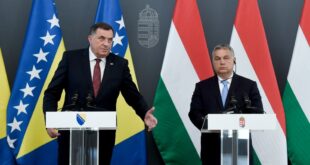By Anes Alic in Sarajevo
Five people were indicted on terrorism charges following the June 2010 bombing of a police station in the Bosnian city of Bugojno, but today, prosecutors are focusing more on the international aspect of the case, as leads in the investigation show that the attack may have been organized abroad.
The bomb that exploded on 27 June 2010 at the Bugojno police station, some 70 kilometers southwest of the capital, Sarajevo, killed one police officer and injured six others. The subsequent investigation points toward what appears to be a new group within the radical Wahhabi movement, and police have so far arrested five of its members, charging them with terrorism.
One suspect, Haris ‘Oks’ Causevic, from Bugojno, confessed to having placed a bag with 15 kilograms of explosive against the back wall of the police station, setting it off and attempting to flee before being seized by police. While attempting to escape, he also threw a grenade at police officers.
In the last few years, Causevic, also an expert in computers, had become more active on internet forums, using the nickname ‘Oks 315’. He is believed to have sabotaged several ‘secular’ internet sites, including government websites. (Start magazine 28.12.2010).
The motive behind the terrorist attack in Bugojno was most probably revenge for the arrest of the Rustempasic brothers and others currently being tried for terrorism and illegal trafficking in weapons and military equipment. (Dnevni Avaz 04.07.2010)
Significantly, however, the attack revealed a new trend among the radical Muslims in Bosnia and Herzegovina, particularly putting the spotlight on one branch of the sect, which through its intolerant and violent activism, is threating to further endanger the country’s security and also to provoke incidents between Bosnia’s moderate Muslims and followers of Saudi Arabia-imported Wahhabi ideology.
Takfiri ideology is classified as a violent offshoot of the Salafi movement, allowing the acts of violence as legitimate methods of achieving religious or political goals. Takfiris believe that one who deliberately kills himself whilst attempting to kill his enemies is a martyr and therefore goes straight to heaven.
The followers of the Takfiri ideology believe in violence against everyone who is not a devout Muslim, and they refuse to recognize the authority of the Bosnian legal system.
Naser Palislamovic is a Takfiri of Bosnian origin, and an alleged organizer of the terrorist attack in Bugojno. Investigators believe he hired Haris Causevic, his brother-in-law, to complete this task. Three others were indicted for supplying the explosives.
Unlike the other radical Muslims groups in Bosnia, most of them founded as the remnants of the various organizations operating during the 1992-1995 war and which profess more of a ‘missionary’ objective, the members of the Takfiri ideology advocate violent clashes with all others.
Bosnian police and intelligence officials claim that both Palislamovic and Causevic received their instructions to bomb the Bugojno police station from the Austria capital, Vienna, where the leader of the Bosnian and Serbian Takfiri followers lives. In the ongoing investigation, police established that Causevic and Palislamovic traveled several times to Vienna during the past two years and visited a mosque run by Nedzad Balkan a.k.a. Ebu Muhammed.
A Vienna-born Serbian Muslim and former boxer, Balkan is the leader of the Sahaba Mosque in Vienna’s 7th County and the alleged financier of the Serbia-based Sandzak Wahhabis. As all Wahhabi clerical leaders, in the early 1990s, Balkan studied at the Islamic University in Medina, Saudi Arabia, but he left without graduating, reportedly disappointed with the Saudi political regime.
Upon his return, he preached at the Vienna Al-Tawhid Mosque, but left the mosque due to disagreement with another radical cleric, the purported leader of the Bosnian Wahhabis, Muhamed Porca, and other members of the congregation.
Balkan, along with six other Wahhabis (three of them Austrian citizens) was involved in the beating of Bosnian Serb Mihajlo Kisic in the Bosnian city of Brcko in 2006. After a short trial, the seven were given symbolic sentences and released on parole. Some of them returned to Vienna.
In 2005, Balkan was placed under observation by the Austrian police for publicly condoning the London bombings and for making extremist statements to the Austrian press. The Sahaba prayer room was placed under surveillance in 2008 when it became known that the suspected producer of a threatening video against the Austrian Government frequently attended the prayer room.
The Sahaba Mosque also came under scrutiny during the terror investigation of Bosnian Muslims who tried to attack the US Embassy in Vienna in 2007.
Balkan is also believed to be a religious authority of several radical groups from Bosnia and Serbia. Balkan leads the Vienna-based Kelimetul Haqq organization of Bosnian and Serbian Muslims. The group belongs to the Al-Takfir wal-Hijra movement. (DANI, 12.08. 2008)
The group, which has a ‘branch office’ in the Montenegrin part of Sandzak, has been publishing, among other things, aggressive sermons on the internet. Kelimetul Haqq is actively promoting the concept of holy war and disseminating Jihadist videos and lectures. It has also become very vocal about Bosnia, saying that the Islamic community here is comprised of people who are not ‘true believers’.
Currently, there are two ongoing terrorism trials in Bosnia ‘ both of them linked to Balkan and his congregation. All the key defendants ‘ Causevic and Palislamovic, charged in the Bugojno attack, and Rijad and Muhamed Rustempasic charged with illegal possession of dangerous materials – were frequent visitors of Balkan’s mosque, while Muhamed Rustempasic lived in Vienna.
In October 2009, Bosnian border officers arrested Vienna-based Muhamed Rustempasic on suspicion of trafficking weapons from Austria and Germany to radical Muslim groups in Bosnia. Shortly before that, his brother, Rijad Rustempasic, and the three members of his group – Muhamed Meco, Abdulah Handzic and Edis Velic – were arrested and indicted for the terrorism. All three were members of the El-Mujahid unit, headquartered in central Bosnia, and after the 1992-1995 war they spent some time in Jordan, Saudi Arabia and Chechnya.
A Jamestown source from the Bosnian prosecution said last year that investigators suspected that Muhamed Rustempasic supplied his brother Rijad with most of the military equipment confiscated in the Sarajevo and Bugojno raids. Given the fact that Muhamed is unemployed and lives in Vienna with his wife and two children, the prosecution plans to open an additional investigation together with Austrian authorities which should lend more insight to the group’s financial situation.
The police have concluded that the group was specifically planning to target the Sarajevo central cathedral and the Franciscan monastery in the central Bosnian city of Fojnica. Aside from Catholic institutions, police also have reason to believe that the group was planning to sabotage electricity supply stations and launch attacks against European Forces (EUFOR) in Bosnia.
It is clear that Bosnian security agencies will face an uphill battle in preventing any further attacks such as that launched on the Bugojno police station, despite the fact that many of the country’s radical Muslims are under close surveillance.
The Bugojno attack showed that the new generation of radicals is keen to make its presence felt, and unlike their missionary brethren, they despise the Bosnian state, the country’s traditionally moderate Muslims, and the Bosnian Islamic Community ‘ as well as all others who do not share their religious views. The additional problem for Bosnian security forces and its citizens is that the attack can happen anywhere and requires only basic organization and modest resources. The bomb used for the police station attack was made out of explosives collected by Causevic and Rijad Rustempasic who visited the war-time front lines looking for old mines, for instance. (01.07. 2010. Oslobodjenje).
Source: isaintel.com
 Eurasia Press & News
Eurasia Press & News



